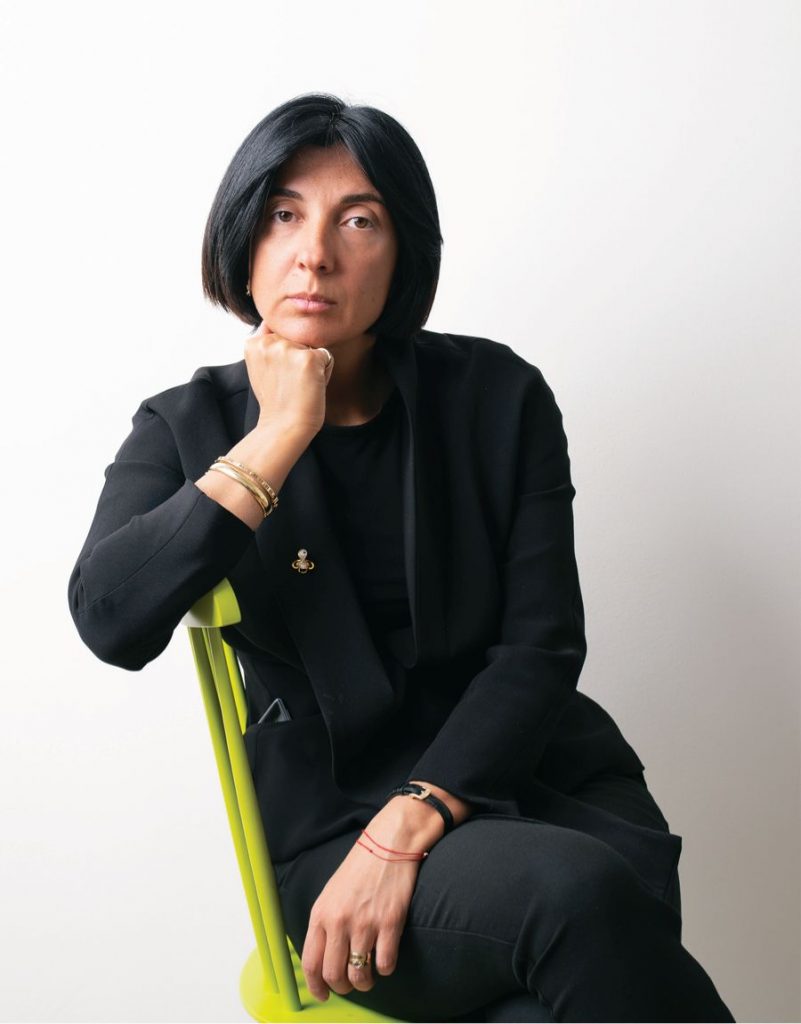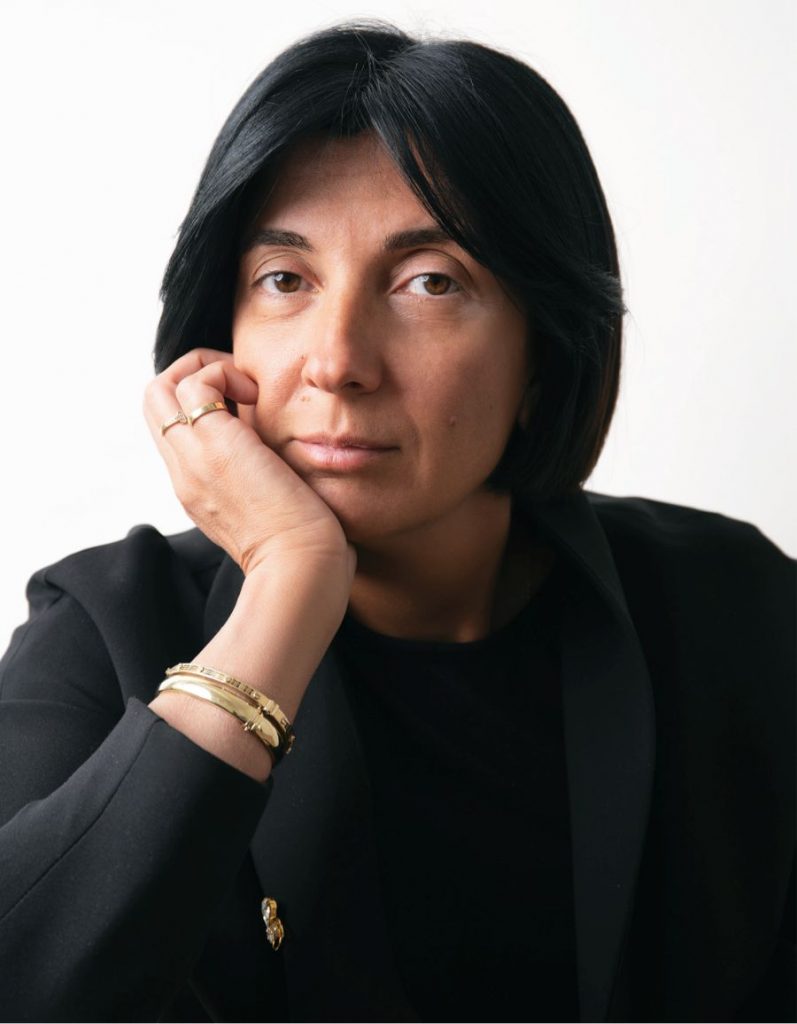
Nino Zambakhidze made an unusual decision in 2008, which radically changed her career path – she left the capital and started farming in Samtskhe-Javakheti. She has faced many challenges and barriers since then, but with patience and perseverance, she successfully passed each stage – she believes that there are many new experiences and challenges ahead, but she is more experienced now to face the future and is ready to share the “lessons” of the past with other people who want to start a business in agriculture. She hopes that her mistakes, experiences, and findings will be a guide for others.
Forbes Woman and VISA present series “She’s Next” and the first respondent of the series Nino Zambakhidze.

How did it all start – why agriculture?
It all started with one life experience – a baby was poisoned with dairy products at home, it was such a disturbing story for me that I started thinking about how we could have healthy food in the family, where we could buy it or even produce. This experience turned out to be the turning point. I wondered, why could not it be me who produces quality dairy products.
I turned the idea into reality with my business partner – at that time agriculture was not a priority for either the state or society. Moreover, the situation was deplorable in this regard, people were hiding their profession and not revealing that they were farmers. It was this kind of approach that led to the situation we had in the field years ago – no one knew where and how products were produced; No one controlled the quality and there was not much demand for quality products.
After observing all this, we concluded that the field was promising and long-term investment in it would yield positive results. I was convinced that there would be a demand for healthy food in the community. At the same time, it was a kind of commitment to start working in this field, I considered that the production of healthy food for future generations was one of the most important challenges for the country.
What were the difficulties for you associated with you being actively involved in this field?
As you know, the field of agriculture in Georgia has been quite masculine for years – this was one of the difficulties. Another type of challenge was the cultural differences that exist between regions within a country – I realized this clearly when I moved from the capital to a region where some things that seemed perfectly normal to me were unacceptable and, conversely, issues that had become normal to them were unacceptable to me. However, many could not hide their surprise when they learned that I had moved to the village to start farming – you know, we have a fairly high rate of urban migration.
The almost insurmountable difficulty was the lack of vocational education in the field of agriculture, which was accompanied by a complete information vacuum in this field.
What circumstances were most prevalent in terms of gender discrimination in the field of agriculture?
Most often the question marks in my address were driven by gender stereotypes formed by the public: “this is not a woman’s job” “She is a manly woman” “What does a woman know about a man’s job?” etc. However, today’s reality is different. I believe that today women are more actively involved in agriculture than men, especially in farming.
To be honest, my biggest frustration and disappointment in this area has to do with my relationships with financial institutions – when I started in this field, the banking institution indicated that it could not lend to me if I did not have a male guarantor, who would share the risks with me. I do not remember anything more offensive than that.
What is the biggest problem, due to which this field is not developing at a proper pace in Georgia?
The development of the sector in Georgia today is hindered by factors directly related to vocational education, limited access to modern technologies and lack of access to financial capital – without all this, it is inconceivable for us to develop agriculture and even more so to reach the level of well-developed countries.
Even one example will clearly show the severity of the problem – imagine, we have more than a million cattle in Georgia, for which the number of qualified veterinarians with access to modern technologies throughout the country does not exceed 100. It is the same as having only 100 doctors per million inhabitants.
What do you think would be the most important piece of advice you would give yourself if you were just starting to work in agriculture?
I would have told myself to learn a lot in the field in which I was planning to invest. I admit I made a mistake when I thought that working in agriculture would be easy. It did not turn out that way – this field has difficulties, you have to understand several issues in-depth, you have to assess the long-term risks correctly – you will not learn all this along the way.
However, when I was taking my first steps in this field there were very few people around me for whom I could ask for advice. This is not the case today – many professionals are ready to consult you, help you, share their experience.

Do women need role models in this field and what path should they take to be role models for others?
I believe that role models in all fields are needed to share their experience, their path to success. It is necessary to avoid the mistakes that others have made and shared with us. I was very short of it all when I started farming. Today, role models motivate us, mentor us, and young people in Georgia already have the opportunity to learn best practices from farmers of their generation.
Does agriculture have the potential to become a major player in the small business sector?
I think it is quite realistic for this sector to occupy an important place in the small business sector. I believe that the climate and relief of the country if properly planned, allows us to produce more and quality products. More small and medium entrepreneurs will make us less dependent on one manufacturer. We have the potential for success.
What should we consider when investing in this field?
First of all, it is necessary to research all the necessary data in this direction, to gain knowledge – we must never start from the end: first learn, research, prepare and only then start doing business and investing in agriculture.
We must also keep in mind that investing in this area is linked to long-term planning. We should not expect to get a high return on equity in an expedited manner.
How do you imagine a future woman in this field?
The woman of the future will be highly educated, self-realized, proud, prepared for every new challenge that does the work of the future, and at the same time, breaks all the stereotypes that are firmly rooted in society towards farmers.
What will Nino Zambakhidze be like in a few years – what’s next for you?
I believe that I will be the same as I am today – very eager to develop agriculture. Probably more modernized and digitized. Today everything is digitalized, therefore I want to introduce a lot of innovations in agriculture; I want to have a large dose of artificial intelligence, various technologies in my work.
I do not know whether I see myself in agriculture after years – I think contributing to the development of agro-tourism, including the presentation of hospitality in various niches, even in the regions.
How important is VISA’s She’s Next initiative and what positive changes can it bring?
In general, I believe that this kind of educational activities on the part of the private sector plays an important role in the development of female entrepreneurs. One is when we have a good and thorough theoretical education and the other is when we share already well-experienced practices. This increases young entrepreneurs’ motivation, makes them more confident, helps them find the necessary contacts, and so on. Also, at such meetings there is a good chance that a complete stranger will have a significant positive impact on our career path – I even have a personal example when a complete stranger played a very important role in the development of my career path, I later chose her as a mentor. It is such experiences that allow me to say that initiatives such as She’s Next are the beginning of significant positive changes.

